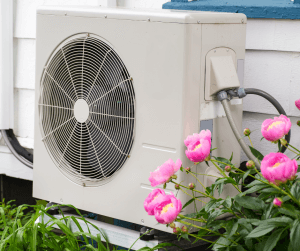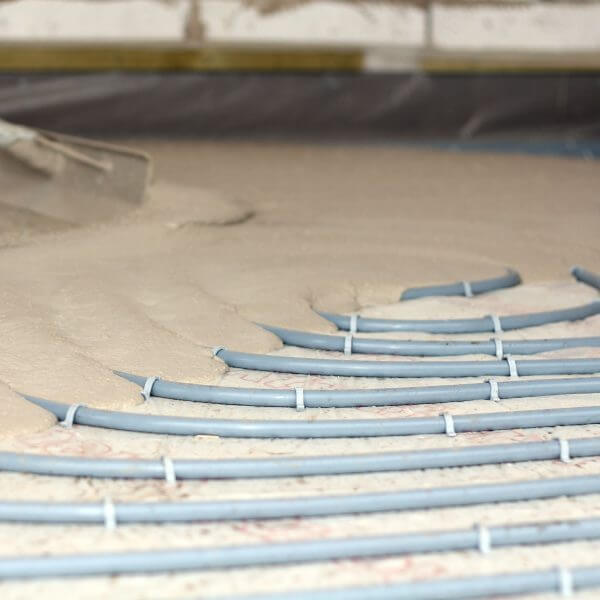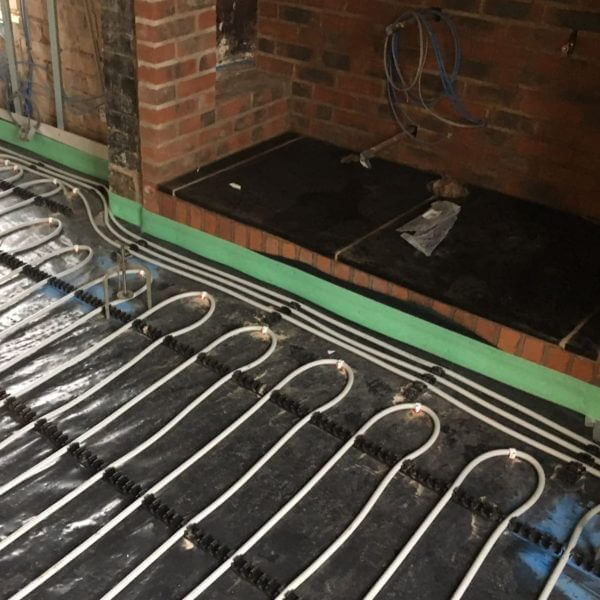The Most Cost-Effective Type of Underfloor Heating
With little doubt, underfloor heating is much more efficient than standard radiator heating setups. The explanation of how underfloor heating works better is because it works at a lower temperature and with more efficient distribution compared to radiators.
There are two types of underfloor systems, electric, and water (also known as wet or hydronic heating). The benefits of each underfloor heating system are significantly different, as they are installed and operate very distinctly to each other. Choosing the right heating to support your needs is essential, especially if you are installing the system to reduce operational costs and energy bills.
How does Electric Underfloor Heating Work?
This system operates similarly to an electric blanket, where a thin heating wire encased in a mat or insulation runs a circuit through the area it is laid in. The wire heats up from the electric current, and that heat is transferred upwards to the floor.
The benefit of electric underfloor heating is that it is very easy to install, especially in historic buildings where new plumbing work is complicated to retrofit. There is also no risk of leaks developing over the course of its lifespan, however this specific problem can often be attributed to poor care and installation.
Our underfloor heating Birmingham firm is very meticulous about how we install water underfloor heating pipes. By running continuous loops that only have joints at the manifold, leaks are greatly reduced and easier to repair should they occur. Electric systems can easily be installed incorrectly, and require repairs when wires are broken or corroded.
Is Electric Heating Cost Efficient?
A typical electric system will cost 100–150 watts (w) of electricity per metre squared (m²) per hour. If you had 18m² of electric heating installed then it would cost approximately 2,700w, or 2.7kW to run for an hour. Using the current electric price of 32p per kW, you would be looking at an operational cost in the area of 86p for an hour of heating*. This is assuming there are no sources of renewable electricity, such as wind or solar power, being generated and utilised on the property.
An electric setup currently costs more to run than a hydronic setup. In part, that is due to the high price of electricity compared to gas (currently 10.30p per kWh). However, it is also due to the fact it is less efficient to run in comparison. Electric underfloor heating generally requires longer active operation to maintain your desired room temperature.
*Figures accurate as of May 2023.
The Benefits Of Wet Underfloor Heating
Hydronic heating works similarly to radiator heating, except the network of pipes circulates warm water beneath the floor, rather than at a single fixed point in the room. This is a more efficient setup and ensures rooms are heated evenly. A typical radiator system needs to be heated to 70°c by a gas boiler, whereas a hydronic system can operate effectively at 40°c.
Water based underfloor heating systems do not lose efficiency covering large open rooms when planned correctly. Utilising proper zoning, water based heating can eliminate cold spots in rooms. With electric based systems, efficient zoning can be harder to implement, and hot spots can become an issue.
This system is highly compatible with energy efficient and renewable energy sources. With heat pumps becoming more popular, our underfloor heating Birmingham company is often integrating these into our installations. Heat pumps are very effective at heating water at low temperatures, perfect for hydronic setups. Furthermore, the use of heat pumps can lower operational costs. Electric heating is currently incompatible with heat pumps.
Because of these factors, heating a property with a wet system is approximately 1/3rd of the cost of an electric system per day. The true difference depends on many factors, such as insulation, the quality of the installation, renewable energy sources, etc.

A heat pump contributing to the energy and cost efficiency of a wet underfloor heating setup.
Which is More Efficient?
When it comes to underfloor heating, it’s crucial to consider the long-term costs and benefits of each system. Electric systems have their strength in how easy it is to install them, reducing costs in that regard. However, electricity prices combined with longer operation time reduces their cost efficiency in the long run.
In the opinion of our underfloor heating Birmingham installers, water based heating is much more cost-effective for heating large rooms and properties. We have been able to effectively install heating for atriums that are 250m² in size, as well as open office spaces, providing our clients with reduced operating costs and less reliance on radiator heating systems.
Water based systems are compatible with heat pumps, helping to reduce reliance on natural gas. Currently, there are grant schemes available that can offset the cost of installing new eco-friendly heating, making it possible to reduce the cost of upgrading to a hydronic system that uses a heat pump.




Where To Find Us